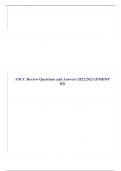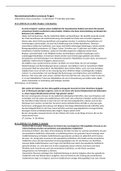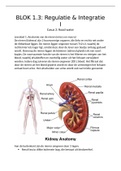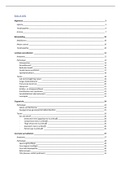The tragedy of Romeo and Juliet
Key words:
Malapropism : incorrectly saying words
Effeminate : a man having characteristics that are associated with women (considered
inappropriate for men)
Phallic imagery : relating to or resembling a males private parts
Dichotomy : a division between two things that are or are represented as opposing or
completely different
Soliloquy : only person on stage, speaks thoughts or emotions aloud.
Ineffable : too great or too extreme to be expressed or described in words
Poetic apostrophe : an address to a dead or absent person or personification as if they’re
present
Infatuation : obsessively strong love for someone or something
Plethora : excessive amount of something
Fickle : changing frequently, especially as regards to one’s loyalties or affections
Replete : filled or well supplied with something
Macrocosm : the whole of a complex structure contrasted with a small or representative part of
it (world, universe, sun moon, stars)
Allegory : story, poem, picture that can be interpreted to reveal a hidden meaning typically a
moral
Romeo
“Shuts up his windows, locks fair daylight out, and makes himself an artificial night”
- Harsh verbs ‘shuts’ and ‘locks’ and ‘makes’ reflects the extent to which Romeo inflicts
isolation upon himself
- Self inflicted isolation as a coping mechanism following his brutal rejection and
unrequited love with Rosaline
- The dichotomy set up between ‘daylight’ and ‘night’ reflects Romeo’s conflicting
emotions.
- Back up quotes: “sad hours seem long” “i have lost myself” “this is not Romeo, he’s
some other where”
“She’ll not be hit with cupid’s arrow, she hath Dian’s wit”
- Metaphor
- He is continuing a metaphor begun by Benvolio who described Rosaline as a ‘right mark’
who will be ‘soonest hit’ as if she is a metaphorical target which Romeo is aiming his
desires towards.
- She will not be readily pierced by love.
- Modern and shakespearean audiences would be familiar with the concept of cupid
- Diana was a notorious virgin goddess.
, - Rosaline’s chastity makes her well armed and it is strong enough to defend her against
the attacking force of love. The allusion to armour implies that to Romeo’s frustration,
the way into Rosaline’s heart is impenetrable and conquering her chastity is like a battle
to be won.
- ‘Hit’ could be a crude euphemism for sex, the arrow could be a phallic symbol alluding
to Romeo’s private parts.
- He compares her to a goddess therefore elevating her status beyond the realm of a
mortal woman.
- Back up quotes: “she lives uncharmed”
“I am too sore enpierced with his shaft”
“Under love’s heavy burden do I sink”
- Violent metaphors suggest that he’s been stabbed which evokes sympathy from a
modern audience.
- Contrastingly, this may draw criticism from a Shakespearean audience, seeing how
Romeo is allowing love to heavily impact him in comparison to Mercutio who compares
love as “too great oppression for a tender thing”.
- Romeo defies societal expectations of men, he is rather ‘effeminate’ and he blames this
on Juliet’s beauty.
- Love is overwhelming and tormenting. He is being rather pessimistic in his journey to
finding the ‘one’ because he doesn’t receive reciprocated feelings back.
- He will permanently be depressed and heartbroken, not easily healed.
- Back up quotes: “it is too rough, too rude, too boisterous and it pricks like a thorn”
- The repetition of ‘too’ reflects the significant impact of love on him. Rough, rude,
boisterous have negative connotations, here Romeo is frustrated and builds up a wall
between him and love.
- “Pricks like a thorn” the simile alludes to a flower which connotes vitality, delicacy and
purity however the ‘thorn’ reveals the downside and hidden struggles to such a pure
thing as love. This highlights his torment and symbolises the complexity of love.
- “She is rich in beauty”
Benvolio asks “why art thou mad?”
“Not mad, but bound more than a madman is: shut up in prison, kept without my
food, whipt and tormented”
- During the Shakespearean era, madmen were locked away and abused.
- By comparing the torment of love as being in a prison cell, Romeo demonstrates how
harmful love can be to his mental state.
“O brawling love, O loving hate”
- Use of oxymorons amplifies the ineffable quality of love: it is full of contradictions and
does not make sense.
- The speech is 13 lines which is arguably an imperfect sonnet. This reflects the idea that
Romeo’s experience with love is incomplete and flawed.
Key words:
Malapropism : incorrectly saying words
Effeminate : a man having characteristics that are associated with women (considered
inappropriate for men)
Phallic imagery : relating to or resembling a males private parts
Dichotomy : a division between two things that are or are represented as opposing or
completely different
Soliloquy : only person on stage, speaks thoughts or emotions aloud.
Ineffable : too great or too extreme to be expressed or described in words
Poetic apostrophe : an address to a dead or absent person or personification as if they’re
present
Infatuation : obsessively strong love for someone or something
Plethora : excessive amount of something
Fickle : changing frequently, especially as regards to one’s loyalties or affections
Replete : filled or well supplied with something
Macrocosm : the whole of a complex structure contrasted with a small or representative part of
it (world, universe, sun moon, stars)
Allegory : story, poem, picture that can be interpreted to reveal a hidden meaning typically a
moral
Romeo
“Shuts up his windows, locks fair daylight out, and makes himself an artificial night”
- Harsh verbs ‘shuts’ and ‘locks’ and ‘makes’ reflects the extent to which Romeo inflicts
isolation upon himself
- Self inflicted isolation as a coping mechanism following his brutal rejection and
unrequited love with Rosaline
- The dichotomy set up between ‘daylight’ and ‘night’ reflects Romeo’s conflicting
emotions.
- Back up quotes: “sad hours seem long” “i have lost myself” “this is not Romeo, he’s
some other where”
“She’ll not be hit with cupid’s arrow, she hath Dian’s wit”
- Metaphor
- He is continuing a metaphor begun by Benvolio who described Rosaline as a ‘right mark’
who will be ‘soonest hit’ as if she is a metaphorical target which Romeo is aiming his
desires towards.
- She will not be readily pierced by love.
- Modern and shakespearean audiences would be familiar with the concept of cupid
- Diana was a notorious virgin goddess.
, - Rosaline’s chastity makes her well armed and it is strong enough to defend her against
the attacking force of love. The allusion to armour implies that to Romeo’s frustration,
the way into Rosaline’s heart is impenetrable and conquering her chastity is like a battle
to be won.
- ‘Hit’ could be a crude euphemism for sex, the arrow could be a phallic symbol alluding
to Romeo’s private parts.
- He compares her to a goddess therefore elevating her status beyond the realm of a
mortal woman.
- Back up quotes: “she lives uncharmed”
“I am too sore enpierced with his shaft”
“Under love’s heavy burden do I sink”
- Violent metaphors suggest that he’s been stabbed which evokes sympathy from a
modern audience.
- Contrastingly, this may draw criticism from a Shakespearean audience, seeing how
Romeo is allowing love to heavily impact him in comparison to Mercutio who compares
love as “too great oppression for a tender thing”.
- Romeo defies societal expectations of men, he is rather ‘effeminate’ and he blames this
on Juliet’s beauty.
- Love is overwhelming and tormenting. He is being rather pessimistic in his journey to
finding the ‘one’ because he doesn’t receive reciprocated feelings back.
- He will permanently be depressed and heartbroken, not easily healed.
- Back up quotes: “it is too rough, too rude, too boisterous and it pricks like a thorn”
- The repetition of ‘too’ reflects the significant impact of love on him. Rough, rude,
boisterous have negative connotations, here Romeo is frustrated and builds up a wall
between him and love.
- “Pricks like a thorn” the simile alludes to a flower which connotes vitality, delicacy and
purity however the ‘thorn’ reveals the downside and hidden struggles to such a pure
thing as love. This highlights his torment and symbolises the complexity of love.
- “She is rich in beauty”
Benvolio asks “why art thou mad?”
“Not mad, but bound more than a madman is: shut up in prison, kept without my
food, whipt and tormented”
- During the Shakespearean era, madmen were locked away and abused.
- By comparing the torment of love as being in a prison cell, Romeo demonstrates how
harmful love can be to his mental state.
“O brawling love, O loving hate”
- Use of oxymorons amplifies the ineffable quality of love: it is full of contradictions and
does not make sense.
- The speech is 13 lines which is arguably an imperfect sonnet. This reflects the idea that
Romeo’s experience with love is incomplete and flawed.








